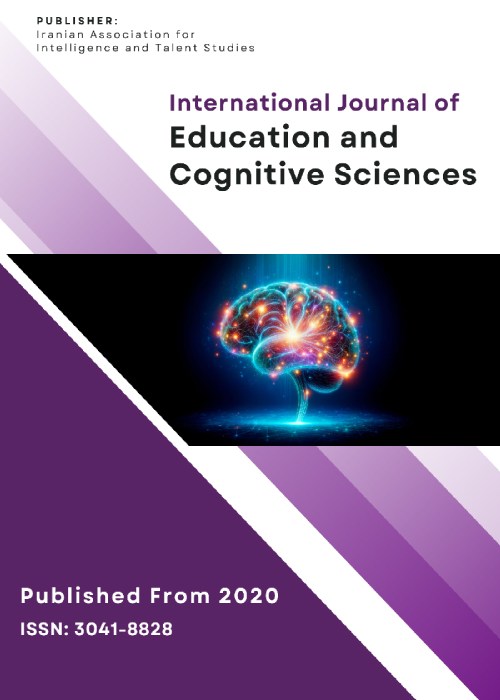فهرست مطالب
International Journal of Education and Cognitive Sciences
Volume:1 Issue: 2, Summer 2020
- تاریخ انتشار: 1399/04/11
- تعداد عناوین: 6
-
Pages 1-10
The purpose of this study was to investigate the relationship between personality characteristics and social self-efficacy with academic motivation in male high school students. The research method was descriptive. 300 students were selected by multistage cluster sampling and responded to the questionnaires of personality characteristic, academic motivation and social self-efficacy. Finding The results of Pearson correlation coefficient showed that there is significant correlation between students’ academic motivation and five personality characteristics, including neuroticism, openness, agreeableness, extraversion, and conscientiousness. Also, there was a significant positive correlation between social self-efficacy and academic motivation. Results of regression analysis showed that the personality characteristics of social self-efficacy and conscientious was able to predict and explain the positively and significantly the academic motivation of boy students. Attitudes and abilities in adapt to circumstances causes reduced stresses including academic, emotional and social stress. On the other hand, weak self-efficacy results in negative evaluation, unfavorable and the sense of disability and helpless.
Keywords: Academic motivation Social self, efficacy Personality characteristics -
Pages 11-17
The current study aimed to determine the differences between psychological Stress tolerance and executive function in normal people and individuals with Obsessive-compulsive disorder (OCD) and depression. The statistical population if the study includes OCD, depressed and normal people. The study method was Causal-Comparative. Study sample includes 90 people with OCD, depression and normal people (30 people each) which were selected by purposive sampling procedure. Beck depression inventory, the distress tolerance and obsessive- intellectual (MOCI) scale and Wisconsin test were employed for assessment of the variables. MANOVA and follow up test were used for data analysis. Findings reveal that, there were significant differences in psychological tolerance distress and aspect of executive function in groups (p<0.001). Patients with OCD had significant deficiency in abstract thought, cognitive flexibility and improving efficiency with normal people. In addition, depressed people had got these deficiency which was a high difference (= 0.37). Due to the significant difference in Psychological tolerance stress and aspect of executive function in OCD, depressed and normal people it is necessary that the patient get an appropriate treatment by considering the psychological and aspect of executive function.
Keywords: Obsessive, compulsive disorder Psychological Stress tolerance Executive function Depression -
Pages 18-27This paper examines relationship between Sensation seeking and quality of life with hope of life in Tehran high school teachers. Sample consists of 367 teachers which have chosen by multi-cluster random sampling. Quality of life questionnaire, life hopes questionnaire and sensation seeking questionnaire were employed to collect data. Data analysis involved both descriptive and inferential statistics including mean, standard deviation, Pearson's correlation coefficient and multi stage regression analysis and sequential equation modeling. Finding reveals that Sensation seeking, hope of life and life quality can significantly predict quality of life. Among 7 sub variables of sensation seeking 3 sub variables (total sensation seeking variety seeking and get redness) and hope of life and motivation in hope of life variable have significant effect on quality of life. Finally all factor load predicted latent variables significantly. Positive sensation seeking helps teacher to increase their hope of life.Keywords: Sensation seeking, Quality of Life, Hope of life
-
Pages 28-33The purpose of this study was to investigate relationships between resilience with conflicts resolution in teachers. For this purpose, 297 teachers were selected by employing multistage cluster sampling. They completed conflicts resolution (Weeks, 1994) and resilience (Connor & Davidson, 2003) scales in turn. Results revealed that there is a significant relationship between resilience, and theirs components with conflicts resolution. The analysis of regression showed that resilience positively and significantly can predict teacher's conflicts resolution (P< .001, R2= 0.43). The findings indicated that resilience and its component had important role in prediction of teacher's conflicts resolution.Keywords: Conflicts resolution, Resilience, Teachers
-
Pages 34-37The current paper aims to identify existed component of dispatch teachers' model in Iran through content analysis technic. The statistical population of the present study was pointed to the dispatch teacher in Iran overseas. The final component models included content analysis were applied to extract the final component which were 1-having formal certificate2- at least 3 years of experience 3- at least Having B.A (Bachelor of art) Document 4-acceptence in entrance Exam and interview 5- computer dominancy 6-acceptance from moral and selective sources 7-accepted evaluation score in the last 3 years of teaching and 8-mental health9- dominance in reading holy Quran 10-married statue11-not having stable experience of being abroad 12- not having more than 3 childeren13-delivering moral commitment for coming back to Iran againKeywords: Dispatch teacher, Pathology, Delphi method
-
Pages 38-43The present study aimed to determine the effectiveness of anger management training on marital satisfaction of spouse of addicted patients in addiction treatment centers in Bojnourd. The present experiment is a pretest and posttest with control group kind. For selecting the needed samples, available sampling method was used. 30 spouses of addicted people who were ready to cooperate and participate in educational sessions were chosen and randomly assigned in experimental and control groups. Anger management skills were taught to experimental group during 10 sessions of 90 minutes. Using questionnaire of marital satisfaction (Olson, Fournier & Druckman, 1987) data was collected at pretest and posttest and covariance analysis were used to test the research hypothesis. Results indicated that training of anger management skills can significantly impact on increase marital satisfaction (P<0.01). The results of the study provide some evidence to suggest that training anger management skills is an appropriate method for increasing marital satisfaction. Anger management skills training help women probably by reinforcement of the behavior skills of regulation change and create desirable emotions and control their violence.Keywords: Addiction, Anger Management, marital satisfaction


